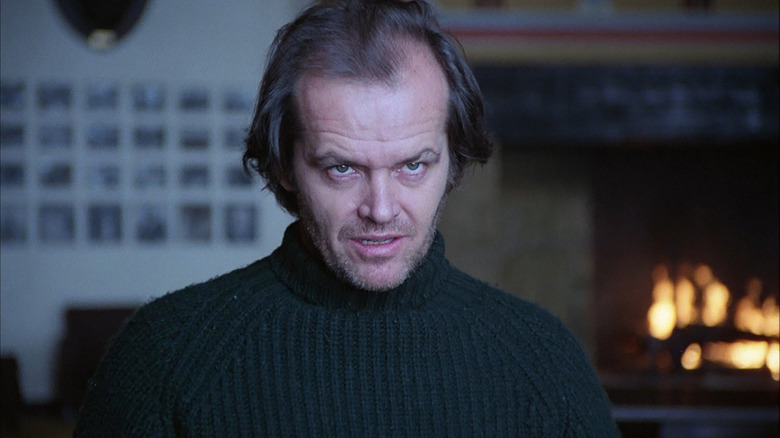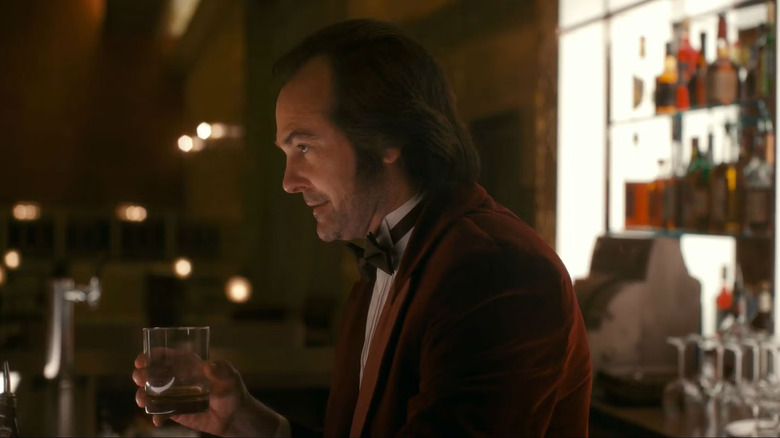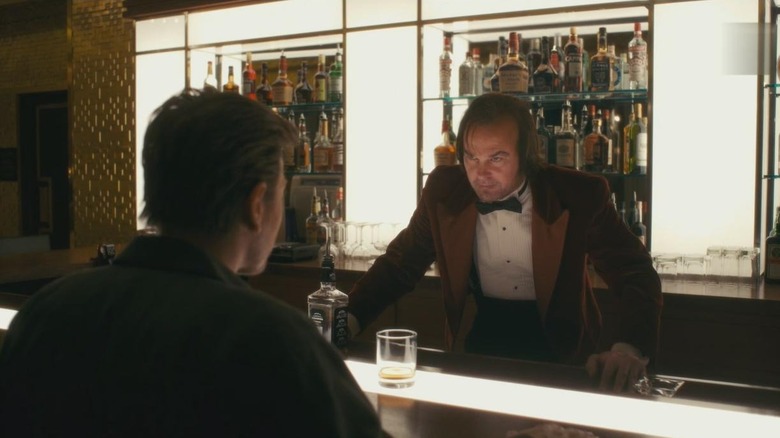Jack Nicholson Refused To Return To Acting For A Stephen King Adaptation
Mike Flanagan's "Doctor Sleep" is a miracle of a movie. It's a faithful adaptation of author Stephen King's 2013 novel of the same name, which itself is a follow-up to King's novel version of "The Shining" from 1977. It's also, however, a sequel (and a bit of a legacy sequel at that) to Stanley Kubrick's 1980 cinematic adaptation of "The Shining," and it's this latter aspect which still seems staggeringly impossible to do on paper, even as Flanagan ended up deftly proving that it was very possible. After all, upon taking on "Doctor Sleep," Flanagan was facing numerous obstacles: first and foremost, a sequel to a Kubrick movie is a daunting prospect all by itself (Peter Hyams did his best with 1984's "2010: The Year We Make Contact," but it pales in comparison to Kubrick's "2001: A Space Odyssey"). The second, even tougher issue involves King's infamous distaste for Kubrick's film; given the disparities between Kubrick's movie and King's novel, and the fact that those differences make up the bulk of contention between author and filmmaker, how in the world was Flanagan going to appease both masters?
Ultimately, the Occam's Razor of adapting "Doctor Sleep" was the key. Since the novel generally concerns an adult Dan Torrence (played by Ewan McGregor) being made to face his literal and figurative demons while confronted by his past, Flanagan decided to make the subtext text as much as he could, allowing the thorny issues between Kubrick and King to come up naturally, without feeling like they had to be either relitigated or ignored. Of course, that doesn't mean that sacrifices of both King and Kubrick weren't made; on the latter side, Flanagan made the appropriate choice of recasting Jack Torrence, Wendy Torrence, and Dick Hallorann for their use in flashbacks and visions. Yet he did have an interesting dilemma, or rather a potential opportunity, in terms of involving Jack Nicholson, who portrayed Jack in Kubrick's film. Sadly, although Flanagan expressed some interest in involving Nicholson with the film in some capacity, the actor refused to break his retirement to appear in "Doctor Sleep."
Exit Nicholson, enter Thomas
To be clear, it seems Flanagan never considered having Nicholson appear as the ghost of Jack, who calls himself Lloyd when Dan has a confrontation with him in the Overlook at the climax of the film. As Flanagan told Vanity Fair in 2019:
"The strategy for that was to find actors who remind us of those actors, that have just enough similarities that you can check off a couple of boxes that help really clearly point you to the character."
That aside, the filmmaker did briefly consider involving Nicholson in some small capacity, perhaps in a cameo appearance. In any case, he wanted to make sure that the actor knew what was up with the film and whether he was okay with all of it. As Flanagan recalled, Nicholson was amicable while remaining firm about being retired:
"There were initial things where I had been curious about whether or not he wanted any participation in the film whatsoever, in a cameo, any capacity, but he declined. I think he's serious about his retirement. But he offered his support and wished us the best and was aware of everything we were doing. If he had anything bad to say about it, I never heard it."
Once the question of whether or not Nicholson would turn up was answered, Flanagan had to figure out just how he would tackle Jack's appearance in the film, and who would be willing to take the risk of stepping into the role without resorting to impersonation or caricature. Fortunately, he had one of his stock company stalwarts to turn to in Henry Thomas, who was more than willing to put his own head on the proverbial chopping block of legacy, as Flanagan explained:
"He said, 'Look, you're leading with your chin here to get hit for stepping into Kubrick's shadow.' He's like, 'Let me go with you and I'll slip into Jack's [shadow] and we'll go down together.'"
How Mike Flanagan threaded the needle of King's disapproval of Nicholson
As mentioned earlier, Stephen King was adamant that Jack Nicholson's performance in Kubrick's "The Shining" was one of the film's biggest issues. In addition to hoping other actors would've filled the role, King disagreed with the way Nicholson (and Kubrick, by extension) chose to treat Jack. As the author told Deadline (via Indiewire):
"When we first see Jack Nicholson, he's in the office of Mr. Ullman, the manager of the hotel, and you know, then, he's crazy as a s*** house rat. All he does is get crazier. In the book, he's a guy who's struggling with his sanity and finally loses it. To me, that's a tragedy. In the movie, there's no tragedy because there's no real change."
It would've been relatively easy for Flanagan to cast an actor to do a caricature of Nicholson's Jack Torrence; in fact, according to the filmmaker, some of the studio's suggestions was to hire an impersonator, or even stunt cast the Nicholson-esque Christian Slater. Flanagan rightfully understood that doing something like that would only exacerbate King's issues with the character's portrayal, as well as potentially insult Nicholson fans. What's more, doing such a thing would've done the tender scene that "Lloyd" is needed for a disservice. Using this line of thinking, Flanagan realized that it was the character and the scene that he had to serve, not the reference or legacy of "The Shining" per se. Fortunately, Kubrick's choices in "The Shining," particularly regarding the character of Delbert Grady (Philip Stone), who used to be the Overlook's caretaker before being turned into one of its minions, helped provide the answer to this dilemma. As Flanagan explained:
"No one was going to be able to handle someone coming in and doing a Nicholson impression, especially at the full 'Heeeeere's Johnny' level of it. But Jack [Torrance] having been digested by the hotel in the same way Delbert was, and now he just works there, he's just on the staff. He said, 'No sir, you've mistaken me for someone else.' I thought that was Kubrick, in his way, pointing to the solution to how to handle Jack."
Ultimately, while seeing Nicholson come out of retirement to return to the world of "The Shining" could've provided a neat little grace note to the film's legacy and his part in it, Flanagan made the right choice to let "Doctor Sleep" primarily be its own movie. The film isn't there to make people cheer in recognition or wallow in nostalgia, but rather to confront it head on. Like Nicholson, Flanagan, and Dan Torrence came to realize, sometimes it's better to let the past go.


